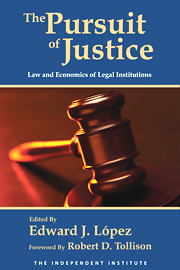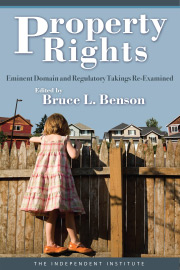Partisanship and waste. Corruption and scandal. Hyper regulation that stifles entrepreneurship. It seems the only news coming out of Washington these days is bad news. Does it have to be this way? History says no.
At various times in U.S. history, new ideas have arisen to challenge the status quo and offer the possibility of constructive change. This process often begins in the Ivory Tower. An academic scribbler pens a new idea about how things should be done in society. Intellectuals adapt it for the political context and popularize proposals for change. The idea takes root in the minds of the public, and this creates the opportunity—or the demand—for change. Politicians then react by implementing policies—new rules of the game.
For an example, flash back to the 1970s. Government control—and scandal—were the new normal. High unemployment had joined high inflation at the hip. Economic malaise had set in, as it has in some ways today. Yet by the end of the decade, something good happened: We saw massive regulatory reform in airlines, trucking, and other industries—to the great benefit of consumers and the nation. How did it happen?
Airline deregulation tells this story well. Until 1978, airline prices were set by the Civil Aeronautics Board (CAB), a federal agency with roots in the New Deal. In the early 1960s academic researchers began studying airlines and the agency. A body of work emerged showing that regulation had been raising airline prices, with no apparent benefits to consumers.
Before long, think tanks in Washington started eavesdropping on these academic conversations. On the political left stood the liberal Brookings Institution. On the right, the conservative American Enterprise Institute. The intellectuals in these think tanks adapted the academic research, explored its political implications, and began communicating key findings to government officials. The idea of deregulation began to take hold. Both the Republican administration of Gerald Ford and the Democratic administration of Jimmy Carter took notice, seeing perhaps a way to tame the politically dangerous beast of inflation.
Yet the public hadn’t taken notice. Nor was deregulation popular in a Democratic Congress. Also, as usual, special-interest groups opposed reform: Some large, established airlines and their employee unions were digging in their heels.
Against these reluctant forces came an unexpected push, from a young Democratic senator by the name of Ted Kennedy. He was looking for a cause, one that would advance his political career. And he found it. Working at his side was a brilliant young advisor by the name of Stephen G. Breyer (who now sits on the U.S. Supreme Court).
Congressional hearings on regulation aren’t typically exciting, but Kennedy knew how to create political theater. His hearings revealed that where a flight crossed state lines (from Washington, DC, to Boston, for example), it cost a traveler twice as much as flights of about the same length within the same state (from Los Angeles to San Francisco, for example). The reason: fares across state lines were set by the CAB.
The public increasingly got the message. Instead of protecting consumers, regulation had killed competition in the industry. For 34 years, the CAB had approved no new airlines. Not one. Kennedy’s hearings headlined these follies on the stage of public opinion. The press ate it up.
Congress started to feel pressure to reform. But against the resistance of a few established airlines and their unions, more was needed. And more came, in the form of a new head of the CAB, a Cornell University economics professor named Alfred Kahn.
Kahn approved the airlines’ “experiments” in market pricing. Thus were born American Airlines’ SuperSaver and Southwest’s Peanuts fares. Kahn eagerly testified before Congress, talked willingly to the press, and smiled as he did it. All over Washington, he made a consistent case for deregulation. The tide had finally turned. Soon, he and Kennedy would win.
With the Airline Deregulation Act of 1978, rate and route regulation was eliminated. A few years later, the Civil Aeronautics Board shut its doors. Yes, an entire government agency closed down. Since deregulation, airfares have plummeted by fifty percent—even with the recent rise in baggage fees. Consumers are better off, and the industry is less wasteful than it was under regulation.
Reform didn’t happen overnight, but it also didn’t happen by accident. The status quo support for regulation had broken down, and there was little that special interests could do to save it. Scholars in ivory towers set the stage for new ideas. Think tanks on the left and right formulated policy proposals. And then the right people—Kennedy and Kahn, a career politician and an academic-turned-bureaucrat—noticed that the time was right for change.
Will the news out of Washington get better? Yes. History tells us that new ideas—hopefully good ones—will come along. A few people, acting like entrepreneurs, will look for the right ideas and the right moment. Whether it’s a reform or a revolution, ideas have had consequences. They will again.









